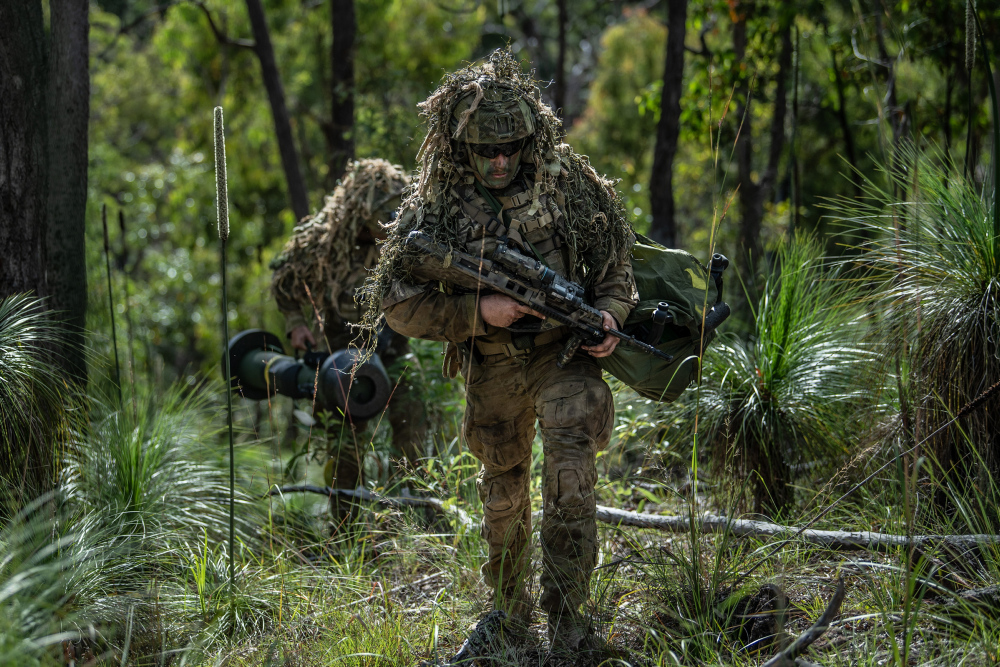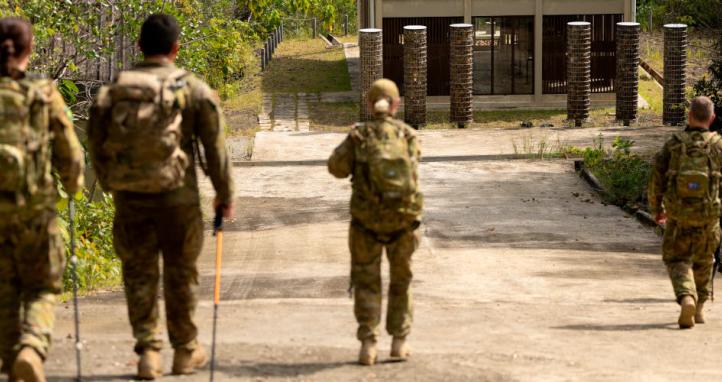Click here to download a printable copy of 'Reflections of a Company Command Team'.
'Fools learn from experience. I prefer to learn from the experience of others.'
– Otto von Bismarck
No higher privilege can be bestowed upon an Australian Army Officer, than that of being afforded the opportunity to command Australian Soldiers. Cliché? Perhaps, but a statement worthy of careful consideration for those afforded such an opportunity. As I continue to reflect on my time as a Company Commander, it is the character and quality of the soldiers and officers that stands out amongst the many great memories. To those officers who have been selected for sub-unit command in the near future, congratulations. As you make your final preparations before you assume command, I provide the following series of reflections that my command team and I put together for our successors.
Command
- Command is absolute. The buck stops with you! Demand the same of your subordinate commanders.
- Authenticity in command. Be yourself. Do not attempt to 'play the part': your subordinates will see straight through you, and your credibility will be undermined.
- Do not tolerate subordinates 'stove piping' responsibility. Example: 'This is Company Sergeant Major (CSM)/Company Quarter Master Sergeant (CQMS) business, sir.' Everything is the commander's (OC) business.
- You are responsible for setting the standard. Ensure you maintain it. Lead by example.
- An open and honest relationship with your CSM is critically important. It's your most important relationship and sets the example for your subordinate command pairings to follow.
- Get out of the office and engage with your soldiers and officers. Participate in training, and ensure you are seen to be at the required training/readiness standard. Lead by example.
- Back your Lieutenants. Do not allow their inexperience to be used against them by experienced senior NCOs. Instead, create mutual development opportunities for subordinate command teams. Use your CSM to support.
- Ensure you give clear concise orders supported by regular back-briefs, up and down the chain of command.
- In the absence of orders, or command guidance, create some, issue it, and execute. If you’re wrong you’ll soon find out, then you’ll have the command direction you were looking for.
- Use doctrine - it works! Don’t cuff it.
- Use the planning process (IMAP/SMAP - Individual Military Appreciation Process / Staff Military Appreciation Process), insist on back-briefs, issue orders in SMEAC (situation, mission, execution, admin & log, command & sig) format, conduct ROC (rehearsal of concept) drills and rehearsals – ensure your subordinates do the same, this all depends on you.
- Ensure your non-commissiond officers (NCOs) are conducting meaningful/useful concurrent activity. Enable your CSM to enforce it.
- Train your subordinates and ensure they do the same with theirs. That means you as an OC personally delivering training.
- Work collaboratively with the other Company Commanders/Majors. Do not allow yourself to view them as career competition. If you do your job to the best of your ability, your career will take care of itself.
- Support the battalion staff, especially the Operations Officer. Talk with them regularly to get ahead of issues, planning and support task requirements.
- Be engaged and understand the bigger picture, but maintain an absolute focus on your company.
- Most importantly, remember it’s about those you command, not you.

Command Team Feedback
An OC is only as successful as the team around them. As my team and I conducted an after action review (AAR) of our time in command, each of my team identified some key conditions that must be set by the OC for their subordinates to succeed in their roles. Company Second in Command
- Extend the Company Second in Command (Coy 2IC) the trust and confidence that he/she can make decisions on your behalf / in your absence.
- Empower the Coy 2IC to command in the OC’s absence by involving him/her in all manner of company related issues.
- Use doctrine and correct planning timelines / processes. Time is a resource and must not be wasted.
- Be cognizant of what you are tasking subordinates: specifically incorrect tasking, over-tasking, double tasking and unnecessary tasking.
- Reward loyalty. Invest in your subordinates’ career progression, professional military education (PME) and professional development (PD).
- Do not be afraid to discipline, fault correct, and adversely report on subordinate officers if they fail to perform to the required standard.
Company Sergeant Major
- Honesty and open communication are vital.
- Ensure you are aligned with the Battalion chain of command, and that you and your CSM are aligned. A CSM will encounter many difficulties if the OC is 'fighting the green' at every chance.
- Allow the CSM to be him/herself.
- No one has the monopoly on good ideas. Good ideas do not wear rank.
- Set an example to the soldiers.
- The OC must address the soldiers, and must be seen as often as is possible. After all, the soldiers will follow the OC and their orders when they cross the line of departure.
- 'I require an OC to be loyal, and they must demand loyalty from their CSM and their subordinates in turn.'
Platoon Commander
- Proficiency in the barracks = proficiency in the field.
- Mentoring: Provide clear expectations, and establish an environment where guidance can be sought as and when required.
- Career management: establish opportunities for continuous professional development for current job, and provide career guidance through development for next job.
- Develop and practice mission command in the field and in the barracks. Allow subordinate freedom of action; let them learn through making mistakes.
- Forecast training requirements well in advance to allow subordinates to learn to plan (booking training areas etc) and manage resources.
- Be approachable and willing to offer advice on personal matters, and matters outside of work, particularly for younger officers.
- Monitor Platoon Commander subordinate familiarity. Address overfamiliarity immediately. It undermines command authority and your chain of command.
Company Quarter Master Sergeant
- The OC must trust the CQMS to do their job, and establish an open and honest relationship.
- The OC must have a good baseline understanding of the logistic system. The CQMS can and will provide subject matter expert advice as required.
- Allow the CQMS time to refurbish and reset post exercise. Provide them the necessary manpower resources to do so.
- Inform, inform, inform the CQMS of future events – daily synch.
- 'Common failings from my previous units, not this year:'
- OC values infantry (RAINF) staff more than support staff (CQMS, Clerk)
- OC attitude is 'just deal with it, or fix it', failure to adhere to previous points.
- OC does not support/back the CQMS in front of others (Q-store staff, Bn leadership)

Organisation
- You can only work with what you have: medically restricted; below worn rank performers; 'average Joe'; or motivated and professional.
- Get your personality pairings right:
- Platoon Commander and Platoon Sergeant.
- Section Commander and Section 2IC.
- Try and minimize disruption.
- Do not constantly rearrange your groupings.
- Set the conditions for their success.
- Foster an inclusive culture. Give new soldiers and officers opportunities to demonstrate competence early and build confidence. Ensure they succeed by pairing them with the right mentor.
Personnel
- Really know your people – use your CSM.
- Get out of your office and talk to your soldiers.
- Command subordinate relationships set the conditions for professional standards.
- Manage the myriad of personnel issues daily. You are responsible for them – if you don’t the situation will deteriorate.
- Make a 'big deal' of honours and awards, new personnel and farewells/retirements. It’s about demonstrating that your soldiers are valued team members.
Accurate and timely reporting
- Reward high performance publicly.
- Do not shy away from the hard truth. Tell your subordinates if they are not meeting the standard, and manage them until they do, or take the necessary administrative action. Do not pass the buck to your successor or through the posting cycle.
- Create opportunities for your subordinates to demonstrate their abilities to their senior assessor, usually the Commanding Officer (CO) or Regimental Sergeant Major (RSM).
- Conduct performance appraisal training for all; do not leave reporting to chance.
- Not everyone can be the number one. Manage subordinate reporting expectations early.
- Be honest with the CO and Career Advisor (CA) regarding your subordinates' performance.
- Governance.
- Readiness (AIRN) is a constant fight through which requires your continuous attention.
- Medical management is your responsibility. You must be proactive: do not rely on others, such as rehab coordinators, to do it for you.
- Health and Safety is laborious and time-consuming, but important. Sentinel is clunky, and a time vampire, however if you are not proactive it will bite you.

Major Systems / Supply and Support
- Equipment readiness = capability. Monitor and be engaged in the technical and non-technical inspection process.
- Know your equipment readiness status at all times.
- CQMS
- Learn and monitor their responsibilities
- Speak to them and their subordinates daily
- Monitor the battalion Quartermaster and CQMS relationship
Individual and Collective Training
- Individual and collective training standards are the foundation of success in combat.
- Basic readiness requirements (AIRN / PESA - Army Individual Readiness Notice / Physical Employment Standards Assessments) are non-negotiable.
- Understand in detail the Army Training Levels / Standards (ATL/S) and the mission essential tasks required at each and every level. This forms the basis for the development of your company training plan.
- A robust training program is essential… plan, plan, plan.
- Have a process for planning, managing, executing and conducting AARs of company training.
- Include subordinates, give clear guidance, and allocate sufficient time and resources.
- Resources.
- Requires detailed analysis of what is required to achieve training.
- Be aware of resource booking lead times.
- Know what is available, and be realistic.
- Certify training personally.
- Conduct AARs and write detailed Post Activity Reports so others can learn from what you did.
- As part of your training program do purposeful physical training (PT) every day. Ensure you, and your entire command team, participates in platoon and section PT. It’s a great way to engage with your soldiers and to get honest feedback. It’s about leading by example.
- You are responsible for all soldier and officer professional development in your company. Have a plan.
- Know your soldiers' and officers' career course requirements. Prepare them well and release them on time to attend.
- Know the individual trade course requirements in relation to your company’s capability requirements.
My time as a company commander was one of the highlights of my career to date and is something I will never forget. Your time will be over before you know it; ensure you enjoy it. I can assure you, having been a soldier myself, that you will have a lasting impact on your soldiers. Remember it’s about them, not you. Duty First.
Command Team Contributors
- Captain Bart Glen – Second in Command, D Coy, 6 RAR 2014.
- Lieutenant (now Captain) Pat Carmody – Platoon Commander 10 Platoon, D Coy, 6 RAR 2014-2015
- Warrant Officer Class Two Matt Lines, MG – Company Sergeant Major D Coy, 6 RAR 2014
- Sergeant (now Warrant Officer Class Two) Mark Fein – Company Quarter Master Sergeant D Coy 6 RAR 2014-2015









